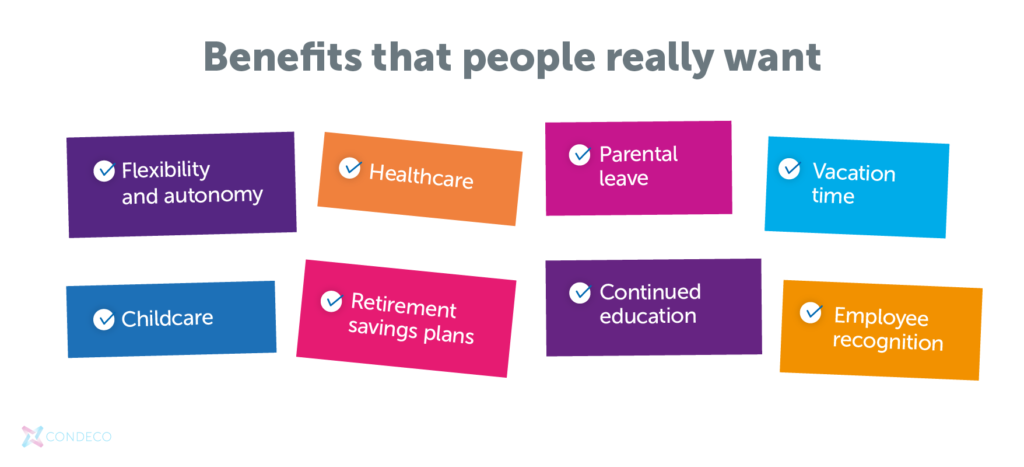
Employee benefits can be challenging. Everyone is unique and motivated by different things. For some, extra holiday can be the deciding factor in choosing one employer over another. For others, finding a company with progressive parental leave policies is a top priority during their job search.
Of course, in many industries, it’s the fun company “perks” like pet-friendly offices or communal ping pong tables that get all the buzz and attention. But do free snacks and branded swag really make a difference in attracting and retaining top talent? We’ve boiled down employee benefits to the ones that jobseekers care about most, so you can invest in the right places. And, as it turns out, many of these benefits can also be more easily implemented with a hybrid working model in place.
Why benefits matter

If you’ve spent any time recruiting for open roles recently, then you know as well as anyone: the battle to attract the best talent is raging across many industries, and skilled jobseekers have the edge. In a market where many of the most desirable workers are entertaining multiple offers in their job search, company benefits are likely to play a key role in their final decision. Offering the right package of benefits can give your business a competitive advantage over other companies that candidates are considering. When given the option, people want to work for a company they believe in, and that they believe will take care of their fundamental needs. And once you’ve hired the right people for the job, strong benefits can boost loyalty, focus, and attendance.
Real benefits vs token benefits
The events of recent years have sparked a massive shift in how many people weigh their priorities, with a growing desire for better work-life balance. The so-called “Great Resignation” of workers leaving their roles for greener pastures has placed mounting pressure on companies to reevaluate their workplace culture and treatment of employees. As some leaders try to lure their teams back into the office with gimmicky perks, savvy workers aren’t so quick to fall for these empty promises. Instead, they’re demanding benefits that will add real value to their lives.
As the cost of living continues to rise worldwide — including for the kinds of necessities that enable people to do their jobs in the first place, like fuel and childcare — people are looking for greater support from their employers. And while nobody is denying that a catered lunch is always a nice gesture, an occasional free salad just doesn’t cut it for having a meaningful impact on most people’s bottom lines. Instead of focusing on these kinds of one-off shows of goodwill, employers need to invest in benefits that have a real, tangible effect on their employees’ lives and job satisfaction.
8 benefits that people really want

1. Flexibility and autonomy
In our changed landscape, long-term flexible work options are increasingly the norm, and expected by many jobseekers. With the transformation of remote work from a benefit that’s “nice-to-have” to one that can be “make-or-break,” it’s important for employers to highlight what kinds of hybrid options they offer. People are looking for freedom in how they get their work done, but they’re also looking for support and strong communication. How has your organization adapted to the unique needs of a hybrid team, and what kinds of systems are in place to better bridge the gap between home and office? Whatever approach to flexible work your company has taken, it’s important to show prospective employees how that model will benefit them.
2. Healthcare
It goes without saying that for most people, healthcare takes top priority when considering the benefits that a company offers. Nothing matters more than the health of ourselves and loved ones, and prospective employees need to feel confident that they’ll have access to quality care through their insurance plan.
While it may be tempting to opt-in to whichever plan costs the company as little as possible, investing in health insurance with better coverage for employees will have long-term benefits for your bottom line. When people have access to high-quality, affordable care, they’re more likely to keep up with routine preventative health appointments. They’re also more willing to seek medical attention for new illnesses and injuries, and will do so sooner than people worried about high out-of-pocket costs. The pay-off? A healthier workforce with higher attendance and stronger performance.
Beyond the basics, there are other opportunities for employers to support the health of their workers. While most U.S. employees must pay a premium out of each paycheck for their medical, dental, and vision insurance, there’s nothing stopping companies from taking on that expense. And doing so doesn’t have to be prohibitively expensive. You may consider covering a certain amount of each employee’s premium up to a certain threshold. Another option is to cover the premium for employees, but require individuals to foot the monthly cost for any dependents they add to their plan.
It’s also worth considering what kinds of supplemental health benefits you can offer your employees. Things like fertility treatment and family planning, mental health services, and long-term disability care are often impossibly expensive for individuals, but special insurance plans can lessen that financial burden at a reasonable cost. Not sure where to start? Don’t be afraid to ask your employees for their feedback on what bonus benefits they would find most useful.
3. Parental leave

In a country with no federally-mandated parental leave, starting a family can be an unattainable goal for many Americans. While there are a handful of states that do require employers to offer some amount of paid maternity leave, companies by-and-large still have discretion to set their own policies. Offering more than the bare minimum for new parents is a guaranteed win for your business. For many job-seekers with the flexibility to be a little picky, supportive parental leave policies may be a priority — not just for their own personal benefit, but also because of what those policies say about how a company views and treats their employees. Even if someone doesn’t have any plans to start a family right now, knowing the option is available can help spark their long-term commitment to staying and growing with the company.
4. Vacation time
Who doesn’t need a little break sometimes? Having the ability to unplug and recharge is crucial for employee mental health — and ultimately, performance. Offering sufficient paid time off ensures that your employees are able to prioritize important parts of their lives beyond work, without worrying about making ends meet. Giving workers the opportunity to devote time to their family, friends, hobbies, and travel will make for well-rounded employees, who return from holiday feeling refreshed and clear-headed.

Many companies have shifted to “unlimited time-off” policies in recent years. And as good as that sounds on paper, this approach doesn’t always end up being so sweet in execution. This freedom can sometimes be daunting, and if managers don’t encourage a culture that supports people taking breaks, that unlimited vacation time can end up being in fact, quite limited. Whatever your policy, making sure that people feel comfortable taking their (much-deserved) time off is crucial to both productivity and morale.
5. Childcare
Rising childcare costs are a struggle for families of nearly all income levels. Increasingly, those costs are outpacing individual earnings, forcing couples to make difficult decisions about whether they can afford for both parents to work full-time while raising young children. For many, the math just doesn’t add up, and one partner must put their career on hold at least until all their kids are school-age. Even for parents who have the flexibility to work from home, going without proper childcare while performing all the functions of a full-time job is a nightmare at best (and actually impossible at worst).

Employers can provide some much-needed relief to working parents by offering benefits like childcare stipends or daycare services. Current workers with children will suffer fewer distractions and be less stressed throughout the day. You’ll also prevent the future loss of talented employees who otherwise might have left the workforce to look after their young family.
6. Retirement savings plans
What’s keeping your best employees from jumping ship to explore new opportunities? Your company’s approach to retirement savings is one area where you can easily create incentive for employees to stick around for the long haul. Offering an employer match on 401(k) contributions will help workers plan and prepare for the future while also building loyalty. By requiring that employees stay with the business for a minimum length of time before they can carry those additional contributions with them, you’ll encourage people to put down roots and grow with the company.
7. Continued education
Each of your employees bring with them their own unique set of skills and experiences. Your most valuable employees are the ones who want to use their talents to help ensure that the business continues to grow and thrive well into the future. You can support the continued professional development of your workers by offering an annual stipend for special training and courses that will help them advance in their roles. Employees who take advantage of opportunities for continuing education will find greater satisfaction and purpose in their jobs, and your company will benefit from an ever-expanding pool of top talent.
8. Employee recognition
At the end of the day, it won’t matter how amazing your benefits are if people don’t feel like their work is appreciated and valued. So while “positive reinforcement” may not get listed in the employee benefits packet in so many words, building a supportive environment deserves just as much thought as you put into those more tangible items on offer. Whether that means encouraging managers to make sure they’re highlighting their teams’ work or implementing a more formal employee recognition program, even a little effort can go a long way.
Give them what they want

Sure, nobody ever said “no” to free snacks — at least not good ones. But fun office perks are just that: perks. To really support your employees and ensure they have everything they need to do good work, you need to invest in the benefits that matter to their overall well-being. Think flexible, think freedom of choice and think long term with your workplace changes. Everyone benefits when your benefits work.



